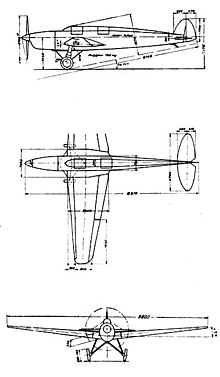Heinkel He 64
| He 64 | |
|---|---|

| |
| Role | Sports plane |
| National origin | Germany |
| Manufacturer | Heinkel |
| Designer | Siegfried and Walter Günter |
| First flight | 1933 |
| Number built | 7 |
| Developed into | Heinkel He 71 |
The Heinkel He 64 was a sports plane built in Germany in 1933 to participate in the touring plane championships that year, designed by Siegfried and Walter Günter.
Development[]
The He 64 was a sleek, low-wing monoplane of conventional configuration with fixed, tailskid undercarriage. The pilot and passenger sat in tandem under a streamlined canopy. Six examples were entered in the championships, which represented almost every example of the type built, the only exception being the first prototype, which had crashed.
Operational history[]
The He 64s shone in speed-related trials, taking the first three places in the 7,363 km (4,601 mi) Europa Rundflug ("Rally over Europe"), and the first five places in top speed trials. They also had high positions in minimal speed trial. Although no He 64 had won in any of the other categories, these wins were sufficient to gain pilot Fritz Morzik an overall tied second place in the contest.
One He 64C was imported into the United Kingdom in 1933 for flap research, at first with Handley Page then with the Royal Aircraft Establishment until 1935. This aircraft later flew in Rhodesia until 1952.
Variants[]
- He 64a
- The prototype of the He 64 family.
- He 64b
- Initial production version
- He 64c
- Later production offering a variety of powerplants, including the de Havilland Gipsy III, Hirth HM 504A-2 and Hirth HM 506
- He 64d
- Two examples of a high speed version were built, powered by the standard Argus As 8R but with elliptical planform wings similar to those fitted to the He 70 and no Handley Page slats. The maximum speed was increased to 290 km/h (180 mph).
Specifications (He 64b)[]

Data from Heinkel:An aircraft album[1]
General characteristics
- Crew: 1
- Capacity: 1 passenger
- Length: 8.319 m (27 ft 3.5 in)
- Wingspan: 9.792 m (32 ft 1.5 in)
- Height: 2.06 m (6 ft 9 in)
- Empty weight: 470 kg (1,036 lb)
- Max takeoff weight: 780 kg (1,720 lb)
- Powerplant: 1 × Argus As 8R 4-cyl. inverted air-cooled in-line piston engine, 110 kW (150 hp)
Performance
- Maximum speed: 245 km/h (152 mph, 132 kn) at sea level
- Cruise speed: 222 km/h (138 mph, 120 kn) at sea level
- Stall speed: 63 km/h (39 mph, 34 kn) (less than)
- Range: 1,500 km (930 mi, 810 nmi)
- Service ceiling: 6,000 m (19,700 ft)
References[]
- ^ St. John Turner, P. (1970). Heinkel:An aircraft album. Shepperton: Ian Allan. pp. 55–56. ISBN 07110 01731.
Bibliography[]
- St. John Turner, P. (1970). Heinkel:An aircraft album. Shepperton: Ian Allan. pp. 55–56. ISBN 07110 01731.
- Heinze, Edwin P.A. "The New Heinkel He 64". Flight: 848-50, 9 September 1932. Retrieved: 24 April 2008.
- Nowarra, Heinz. Die deutsche Luftrüstung 1933-1945. Bonn: Bernard and Graefe, 1983, pp. Teil 2, 173–175.
- Taylor, Michael J.H. Jane's Encyclopedia of Aviation. London: Studio Editions, 1989, pp. 501. ISBN 0-517-10316-8.
External links[]
| Wikimedia Commons has media related to Heinkel He 64. |
- 1930s German sport aircraft
- Heinkel aircraft
- Single-engined tractor aircraft
- Low-wing aircraft
- Aircraft first flown in 1933